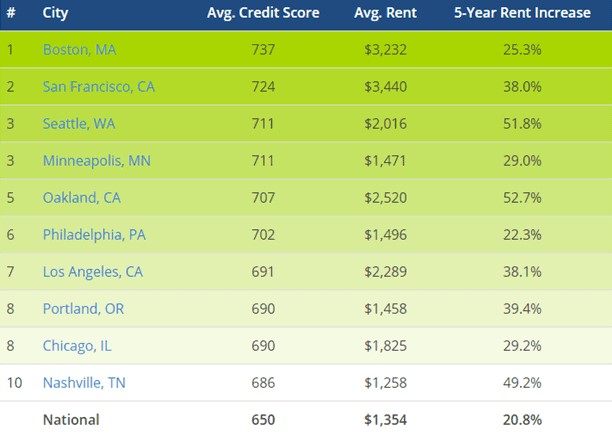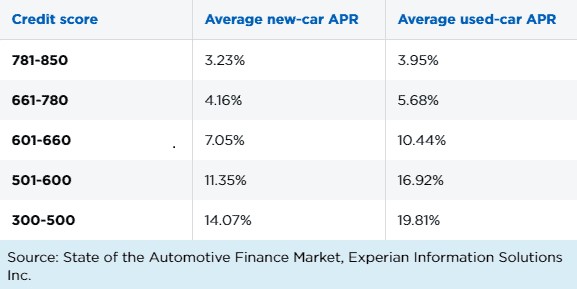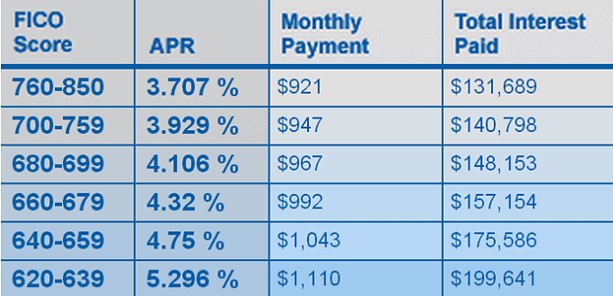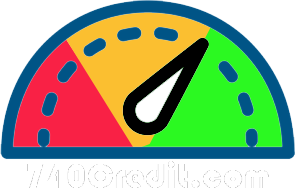Your Eligibility for Renting a Home, Car Loans, Mortgages, and Credit Cards
Credit scores are used by lenders to calculate the risk of lending money. It’s a tool to help creditors determine how likely you are to repay their loan. Most of the major credit agencies in the United States use the FICO score to evaluate your credit health. At some point in your life, you will have your credit evaluated by a business. So how does your credit determine your eligibility for renting a home, car loans, mortgages, and credit cards?
Your FICO credit score, created by the Fair Isaac Corporation, is used by lenders, creditors, landlords, and even employers to assess your credit risk. FICO is the most commonly used credit scoring model in the US.
Your FICO score normally ranges between 300 and 850. So, What’s a good credit score? While each creditor may have their own calculation, generally the following hold true:
- Under 630 is considered poor
- Between 630 and 690 is average
- Between 690 and 720 is good
- 720 or above is excellent
The higher your score, the better rates and terms you will get on loans, mortgages, and even leases (both auto and even home/apartment).
Average credit score by age group

Source: Experian
Credit and Renting
The criteria for a good credit depends on what you’re applying for. It also depends on where you live.
Your credit score is one of the most important factors landlords use when deciding whether to rent to tenants. In cities like Boston, San Francisco, Seattle, Minneapolis and Philadelphia, the average credit score of renters is over 700. But in cities like Greenwood, Mississippi; Albany, Georgia; Laredo, Texas; or Riverside, California, the average credit score is below 650.
Here’s a chart showing the cities with the highest credit scores in the country, so you know what you’re competing against.

Opportunity for Car Loans
Experian recently released a study showing credit scores for new and used car buyers. The average recipient of a new car loan has a 713 credit score. For used cars loans, the average was 656. The type of car loan and terms you qualify for is determined by your eligibility based on your credit score.
Approximately 20 percent of borrowers got a car loan with credit scores below 650 and 5 percent had credit scores below 500. While people with these low credit scores were able to secure a car loan, they paid a lot more for it. It’s very important to understand your credit score before applying for any loan or mortgage.
A credit score of 700 will get you an annual percentage rate (APR) of 4.16-5.68 percent. Meanwhile, a 638 credit score nearly triples that APR. I bet you didn’t realize your credit score was costing you so much! Here’s a breakdown of how credit scores affect the interest rates for car loans:

Let’s say you get an auto loan for $10,000 for five years. With a 4.16 percent APR, you’ll pay a total of $11,204.22, assuming you’re never late with a payment. At 16.92 percent, you pay $15,034.61 by the end of your loan. Even with a higher down payment, you’ll end up with higher monthly payments and pay nearly 40 percent more by the end of your loan.
Borrowers with good credit typically pay less for the down payment
For auto loans that require a down payment, borrowers with good credit typically only must pay $1000 or 10 percent of the selling price. With bad credit, this doubles to 20 percent or more.
A detailed comparison of how much more an auto loan will cost for someone having a 570 credit score versus a credit score of 650.
| Loan Type | Credit Score | Interest Rate | Monthly Payment |
| 36 month loan | 650 | 9.31% | $862 |
| 48 month loan | 650 | 9.33% | $676 |
| 60 month loan | 650 | 9.40% | $566 |
| Loan Type | Credit Score | Interest Rate | Monthly Payment | Added Cost |
| 36 month loan | 570 | 14.80% | $933 | $2,250 |
| 48 month loan | 570 | 14.81% | $749 | $3,491 |
| 60 month loan | 570 | 14.822% | $640 | $4,443 |
Mortgage opportunities
Mortgages have even higher credit requirements! You need a credit score of at least 740 to qualify for the best loans with the lowest down payment requirements and interest rates. Many lenders will qualify you for a conventional mortgage at 700, and some will even finance you as low as 620, although this is easier with VA or USDA backed loans.
Once your credit score drops below 638, your best bet for a mortgage is the Federal Housing Administration (FHA), but you’ll need a down payment of 10 percent. That’s much better than the 20 percent or more needed on a conventional loan. Although with an FHA loan, you’ll need more PMI. PMI stands for Private Mortgage Insurance and it is a type of insurance the protects the lender if you fail to make your monthly payments. It is not something that every lender requires, but the lower your credit score, the higher the chances are that it is something you will be required to get as part of your loan terms.

FHA Loans for lower scores
With an average credit score, you can qualify for FHA loans. Other FHA loan requirements are that you have at least 2 years of employment, which you will be required to provide 2 years of tax returns, and your 2 most recent pay stubs. The maximum debt-to-income ratio is 43% (unless you have satisfactory “compensating factors”, such as a higher down payment, or cash reserves).
The reason behind the popularity of FHA loans is that the down payment requirement is only 3.5%, and it can be borrowed, gifted, or provided through a down payment assistance program.
How much mortgage interest rates vary with credit score
It goes without saying that your credit score affects mortgage interest rates. A FICO score of 700 can get you a 4.49 percent or lower APR. A 620 score can come with a 5.857 percent APR. Over the course of a 30-year mortgage, that’s a difference of $60,000 on a $200,000 home. Of course, mortgage rates are constantly changing. As of August 2021, the average APR is 4.57 percent.
Here’s a chart showing the difference your credit score makes.

Not only does a bad credit score require higher down payments, it increases monthly payments and total loan repayment amounts. That’s why it’s important to maintain a good credit score. Bad credit will come back to haunt you when you try to buy your dream home.
Credit Card Options
Like other lenders, credit lenders use credit scores to calculate eligibility when some applies for a credit card. risk when lending money. It’s a tool to help creditors determine how likely you are to repay their loan. Most of the major credit agencies in the United States use the FICO score to evaluate your credit health.
Each creditor will have its own calculation or parameter to determine a customer’s financial health. If you have an excellent credit score (more than 750) you should have no problems being approved for cards for the lowest rates and best rewards.
For a poor credit score, you will probably only qualify for a secured credit card. With a secured card, you are required to deposit a lump sum of cash to the account and this will be equal to your credit limit. You will essentially be borrowing against your deposit. By making your payments on time, your credit score will rise. To qualify for an unsecured credit card, you need a minimum credit score of 600. It also depends on what type of credit card you are applying for.
Your score also has a significant impact on the APR and other terms of your account. The charts below show the differences in the interest rate and annual fees between someone with a good credit score and a credit score of 570.
| Score | Interest Rate | Balance | Added Cost |
| 720-850 | 4% | $5,000 | |
| 700-719 | 6% | $5,000 | $362 |
| 675-699 | 8% | $5,000 | $774 |
| 620-674 | 10% | $5,000 | $1,250 |
| 619 and lower | 16% | $5,000 | $3,240 |
Frequently asked mortgage questions
Can I get a jumbo loan with a less than excellent credit score?
To qualify for a jumbo loan (a home loan for homes that are considered to costly for conventional mortgage loans) the minimum credit score depends on the lender. Most jumbo lenders prefer a credit score of at least 720 to offer a jumbo loan. However, you can get a jumbo loan with a credit score of 600 from non-prime lenders.
What do non-prime loans offer?
Non-prime loans provide an opportunity to get a mortgage for borrowers that do not qualify for conventional and FHA loans. They have much less strict credit requirements, including no waiting periods after bankruptcies, foreclosures, and short sales. Non-prime loans also are available to borrowers with credit scores as low as 500 (or even below 500).
Can I qualify for a home loan if I have a major credit issue last year?
If you have had a bankruptcy, foreclosure, or short sale, there are several non-prime lenders that offer home loans to borrowers even just 1 day after such events.
What are other credit requirements that I need to know about?
Most mortgage lenders expect mainly 3 trade lines on your credit report like auto loans, credit cards, personal loans, or other qualifying lines of credit. There may be exceptions like alternative bills that are often allowed (phone bills, utilities, etc.).
Is down payment assistance available?
Yes, at present the programs exist at the local (city, county, or state level) and nationwide level. A mortgage lender can help you to check if you qualify for down payment assistance. For lower income individuals, the chances are higher that you will qualify, as these programs are often intended for low income households.
Final Thoughts
As you can see, your eligibility for renting a home, mortgages, car loans, and credit cards depends on your credit score. Try to have the highest score you can to avoid spending unnecessary money. You will find life to be less stressful if you know you are in a state of good financial health and can access loans and credit at favorable terms when you need to.



